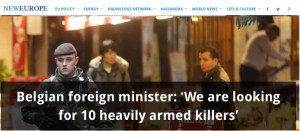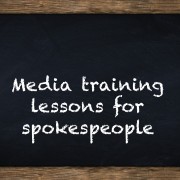Lessons from the Brussels lockdown: Belgium’s foreign minister reminds us that even the most experienced spokesperson can’t always manage the news
There’s an expression used by media trainers called ‘breaking into jail’. This is when spokespeople get themselves into trouble in interviews (and get the wrong sort of headline) without the journalist having to do much to provoke it.
A recent interview with Belgian Foreign Minister Didier Reynders reminds us that even the most experienced spokespeople can have very bad days and lose control of their story.
On 25 November, Mr Reynders (who is fluent in English) was interviewed by ABC journalist Matt Gutman about the security situation in Belgium in general, and in Brussels in particular. He had clear messages he wanted to push (the need for countries to share more intelligence, and the importance of protecting the Belgian population from harm) and he managed to link back to them several times throughout the interview.

Unhelpful headlines from an undisciplined interview
However, in spite of this, the interview yielded the following type of headlines in international and Belgian media:
Belgium’s Foreign Minister Warns of Attack With ‘Heavy Weapons’ and ‘Suicide Bombs’ (ABC)
Didier Reynders: “We are looking for 10 heavily armed people” (RTBF)
‘Belgian foreign minister: ‘We are looking for 10 heavily armed killers’ (New Europe)
This subsequently prompted a U-turn from Mr Reynders’ cabinet (who said he was quoted out of context) and a backlash from the Belgian media who pointed out that other ministers had been far more careful about quantifying the exact nature of the threat to the Belgian public.
You can watch the entire interview here. Below are some quick PR takeaways that I picked out.
Don’t speculate
Spokespeople who speculate or entertain journalists’ speculation during interviews have only themselves to blame. Mr Reynders qualified a lot of his comments throughout the interview. For example, he said the Belgian government was looking for a group of ‘maybe 10, maybe more’ people with ‘heavy weapons’. He then fell into the trap of speculating on what ‘heavy weapons’ might be. For example, he agreed that they might be ‘Kalashnikovs’ and ‘maybe more’. This was hardly precise but it allowed ABC to run with the headline they went with because he had signed off on it all.
Beware the friendly but focused journalist
Lindsay, our MD, has a saying: ‘Always a journalist, sometimes a friend’. This was a soft interview, which was even in tone and questioning (you can tell that Mr Reynders is relaxed from his body language) but it came back to sting. George W Bush used to say that David Frost was the toughest interviewer he had ever faced because his questions were ‘nice’ but often yielded an afterburn. I would say the same is true of Mr Gutman’s approach here.
Spokespeople need to prepare reactive lines, not just messages
Most of Mr Reynders’s problematic comments were reactive rather than planned. (He also offered the information that schools and the metro in Brussels (both of which were closed at that point) were not the real targets and that shopping centres were at biggest risk). Spokespeople need to plan reactive lines in advance so that they don’t let information casually slip. For example, at one point in the interview Mr Reynders confesses that the Belgian security services don’t actually know how many people they are looking for. In turn, this begs the question what on earth he was thinking by trying to put a figure on it? A far better line than ‘maybe 10’ would have been something along the line of ‘we are looking for a small group of people. I can’t quantify the exact numbers’ and then hold his nerve if pushed.
Beware questions that are repeated several times
Mr Guttman did not jump on the answer about the 10 terrorists straight away. He came back to it several times (three in total throughout the interview). But throughout, he kept his tone and body language even and didn’t betray a particular preference for this angle over any other. This gave Mr Reynders the false impression that he hadn’t said anything too sensational. However, an experienced interviewee should have realised that the journalist’s decision to return to the question multiple times during an interview was a sign that the interview was going a certain way and should have been controlled.
These are just a few PR take-ways from the Brussels lockdown. Do you have any others you’d like to share?





Mr Reynders’s unhappy experience also highlights the importance for any interviewee of preparing both content _and_ mind-set, no matter how hugely experienced or time-poor one might be.
Mr Reynders was doubtless under appalling pressure of time, and may also have been lulled into complacency. Either way, a few minutes of prep for the interview – not least reminding himself “This is an interview, not a conversation” – could have saved him far more time and energy in the aftermath.